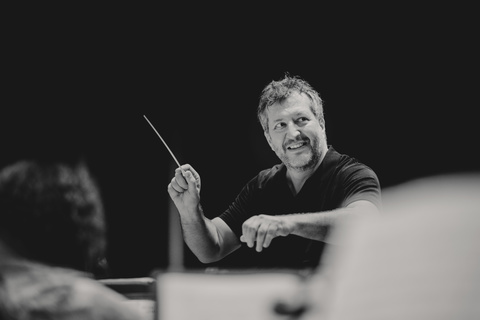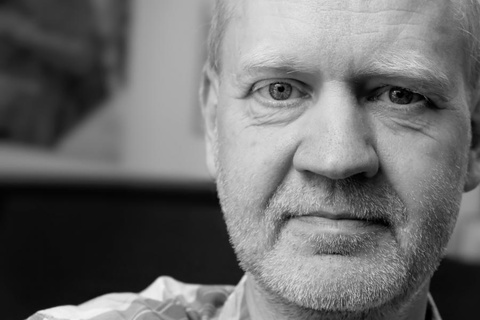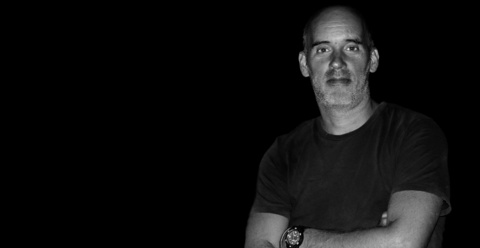CNM Ensemble Concert II
Thursday, December 7, 2023 at 7:30p in the Concert Hall
Program
Catch, for clarinet, violin, cello and piano (1991) |
Thomas ADÉS |
| Sayyod Mirzomurodov, clarinet Yestyn Griffith, violin Hanna Rumora, violoncello Neil Krzeski, piano |
Polykrom (1992) |
Örjan SANDRED |
| Tâmila Freitas de Souza, flute David Cyzak, oboe Sayyod Mirzomurodov, bass clarinet Jo Anne Sukumaran, bassoon Kristen Ronning, horn Anna Kelly, trumpet Xiaoyu Liu, trombone McKenna Blenk and Zoe Dorr, percussion Neil Krzeski, piano Rachel Peters, violin 1 Michael Klyce, violin 2 Rebecca Vieker, viola Hanna Rumora, violoncello Natalia Terra, double bass Samuel Chen, conductor |
intermission
Os sons em volta (2018) |
Carlos CAIRES |
| Tâmila Freitas de Souza, flute Sayyod Mirzomurodov, clarinet McKenna Blenk, percussion Erin Freund, harp Neil Krzeski, piano Yestyn Griffith, violin 1 Rebecca Vieker, viola Hanna Rumora, violoncello Jason Wise, electronics David Gompper, conductor |
The Origin of the Harp, op. 13 (1994) |
Thomas ADÉS |
| Sayyod Mirzomurodov, Lea Banks, Mary Kotrba, clarinets Fatima Gassama, Rebecca Vieker, Christine Rutledge, violas Hanna Rumora, Ryan Doerr, Josh DeVries, violoncelli McKenna Blenk, percussion Samuel Chen, conductor |
Program notes and composer biographies
| Catch structures itself around various combinations of the four instruments. There are several games going on: at the start, the clarinet is the outsider, the other three are the unit, then, after a decoy entry, the clarinet takes the initiative. All four then play jovial ‘pig-in-the-middle’ with each other. The clarinet is then phased out leaving a sullen piano and cello, with interjections based on the clarinet’s original tune. This slower passage gradually mutates back into fast music, and this time the game is in earnest: the piano is squeezed out, only to lure the clarinet finally into the snare of its own music. © Thomas Adès |

His compositions include three operas : the most recent of which The Exterminating Angel premiered at the 2016 Salzburg Festival and subsequently has been performed at the Metropolitan Opera, New York and the Royal Opera House, London all conducted by the composer; The Tempest (Royal Opera House and Metropolitan Opera); and Powder Her Face. His orchestral works include Asyla (CBSO, 1997), Tevot (Berlin Philharmonic and Carnegie Hall, 2007), Polaris (New World Symphony, Miami 2011), Violin Concerto Concentric Paths (Berliner Festspiele and the BBC Proms, 2005), In Seven Days (Piano concerto with moving image - LA Philharmonic and RFH London 2008), Totentanz for mezzo-soprano, baritone, and orchestra (BBC Proms, 2013), and Concerto for Piano and Orchestra (Boston Symphony Orchestra, 2019). His compositions also include numerous celebrated chamber and solo works. Thomas Adès has been an Artistic Partner of the Boston Symphony Orchestra since 2016 and will conduct the orchestra in Boston and at Tanglewood, perform chamber music with the orchestra players, and lead the summer Festival of Contemporary Music. He coaches Piano and Chamber Music annually at the International Musicians Seminar, Prussia Cove. As a conductor, Thomas appears regularly with the Los Angeles, San Francisco and London Philharmonic orchestras, the Boston, London, BBC and City of Birmingham, Symphony orchestras, the Royal Concertgebouworkest, Leipzig Gewandhaus and the Czech Philharmonic. In opera, in addition to The Exterminating Angel, he has conducted The Rake’s Progress at the Royal Opera House and the Zürich Opera, The Tempest at the Metropolitan Opera and Vienna State Opera, and Gerald Barry’s latest opera Alice’s Adventures Under Ground in Los Angeles (world premiere) and in London (European premiere). In the 2019-20 season Thomas has a residency with the Royal Concertgebouworkest and also conducts the London and Helsinki Philharmonic Orchestras and makes his debut with Bavarian Radio Symphony Orchestra. In the USA, he returns to the Los Angeles and Boston Symphony Orchestras. Thomas also returns to the Royal Opera House twice this season, to conduct Barry’s Alice’s Adventures Under Ground and the premiere of his new ballet The Dante Project. His piano engagements include solo recitals at Carnegie Hall (Stern Auditorium), New York and the Wigmore Hall in London, and concerto appearances with the New York Philharmonic. This season will see the release of his album of solo piano music by Janacek and he will also join Simon Keenlyside in a recital of Schubert’s Winterreise at the Vienna State Opera. His many awards include the Grawemeyer Award for Asyla (1999); Royal Philharmonic Society large-scale composition awards for Asyla, The Tempest and Tevot; and Ernst von Siemens Composers' prize for Arcadiana; British Composer Award for The Four Quarters. His CD recording of The Tempest from the Royal Opera House (EMI) won the Contemporary category of the 2010 Gramophone Awards; his DVD of the production from the Metropolitan Opera was awarded the Diapason d'Or de l'année (2013), Best Opera recording (2014 Grammy Awards) and Music DVD Recording of the Year (2014 ECHO Klassik Awards); and The Exterminating Angel won the World Premiere of the Year at the International Opera Awards (2017). In 2015 he was awarded the prestigious Léonie Sonning Music Prize and in Spring 2020 he will receive the Toru Takemitsu composition award at Tokyo Opera City where he will conduct a concert of his own music. |
| The title Polykrom alludes to the idea of creating color contrasts in the composition. In the form they are evoked by using varied orchestra settings in the sections of the piece, and by focusing on different solo instruments (starting with the flute, then the trumpet, oboe, and trombone). However, more important for me with this composition was to create a harmonic language that dissociates itself from treating harmony as just timbre (cluster, etc.). In Polykrom I try to find the way back to the role of harmony as a field of forces between chords, and to make use of this for musical expression. Chords do not have musical functions, and vertical chord structures were not my prime consideration while composing the piece. More important for me was the voice leading and the connections between chords. |

Sandred taught electro-acoustic composition at the Royal College of Music in Stockholm from 1998 to 2005. He is currently a Professor of Composition at the University of Manitoba in Canada, where he founded Studio FLAT - a studio for computer music research and production. In 2016, he was a DAAD visiting professor at Hochschule für Musik Detmold in Germany for 4 months. Sandred studied composition at the Royal College of Music in Stockholm, McGill University (Montreal) and at IRCAM (Paris). Among his teachers are Sven-David Sandström, Pär Lindgren, Magnus Lindberg, Daniel Börtz, Bill Brunson and Bruce Mather. During 1999 he worked as a Composer on Research in the Musical Representation Team at IRCAM. He has a particular interest in Rule-based Computer Assisted Composition techniques, and he has published several articles on the outcome of his ongoing research (for example in Computer Music Journal 2010 and Contemporary Music Review 2009). Sandred regularly receives commissions from ensembles around the world. He has written music for performers such as (in Canada) the Quasar Saxophone Quartet, the Harrington/Loewen Duo, soprano Sarah Jo Kirsch, the Winnipeg Symphony Orchestra, (in Germany/France) the Camilla Hoitenga and Heloïse Dautry duo, Ensemble Ader, (in Sweden) organist Hans-Ola Ericsson, the Peärls Before Swïne Experience, Das Orchestra and the Swedish Radio Orchestra. He is also a frequent guest lecturer around the world. He has given seminars at Harvard University, at University of California at Berkeley and Davis, at Conservatoire National Superieur de Musique in Paris, at the Sibelius Academy in Helsinki, at the Bartok Seminar in Szombathely (Hungary), at Universität für Musik und darstellende Kunst Wien, at the Shanghai Conservatory of Music, at McGill University in Montreal, at the Interdisciplinary Centre for Computer Music Research at the University of Plymouth, at the Iceland Academy of the Arts in Reykjavik and other places. In 2022 Sandred was awarded a Fellowship from the John Simon Guggemheim Foundation. He is a Fellow of the Royal Society of Canada since 2023. Sandred's music is available on the CDs "Sonic Trails" (2020) and "Cracks and Corrosion" (2009). |
| Os sons em volta - Once, for a composition class, my professor, Constança Capdeville (1937-1992) brought the score of her “Libera me”, a piece for choir, piano, percussion and tape. In that afternoon, she was returning from a rehearsal with the Gulbenkian choir (Lisbon). While she was showing me the score and talking to me about the work, at one point, Constança told me something like this: “while composing this work, I went down to the center of the earth and start listening". Since then, I've wanted to do the same.
“Os sons em volta“ (The sounds around), is my homage to her. |

|
| The Origin of the Harp, op. 13 - This piece takes its title from a painting by Daniel Maclise (1806–1870) in the Manchester City Art Gallery. Its subject is the mock Celtic Legend of a water nymph who falls for a mortal and struggles hopelessly to leave her element and join him on land. The Gods, taking pity on her failure, intervene and turn her into a harp, transforming her weeping into a gentle music of wind through strings. The painting shows her in the moment preceding the metamorphosis, the strands of her hair framed by a triangle of her body, a rock and her arm. In this piece, too, the harp itself is not featured but suggested, at the start of the fourth and final section, after a flash of divine intervention. © Thomas Adès |